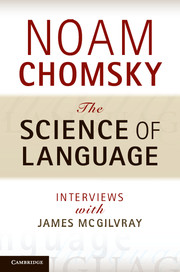Book contents
- Frontmatter
- Contents
- Introduction
- Part I The science of language and mind
- Part II Human nature and its study
- 15 Chomsky on human nature and human understanding
- 16 Human nature and evolution: thoughts on sociobiology and evolutionary psychology
- 17 Human nature again
- 18 Morality and universalization
- 19 Optimism and grounds for it
- 20 Language, agency, common sense, and science
- 21 Philosophers and their roles
- 22 Biophysical limitations on understanding
- 23 Epistemology and biological limits
- 24 Studies of mind and behavior and their limitations
- 25 Linguistics and politics
- Appendices
- Commentaries
- Glossary
- Bibliography
- Index
22 - Biophysical limitations on understanding
from Part II - Human nature and its study
Published online by Cambridge University Press: 05 June 2012
- Frontmatter
- Contents
- Introduction
- Part I The science of language and mind
- Part II Human nature and its study
- 15 Chomsky on human nature and human understanding
- 16 Human nature and evolution: thoughts on sociobiology and evolutionary psychology
- 17 Human nature again
- 18 Morality and universalization
- 19 Optimism and grounds for it
- 20 Language, agency, common sense, and science
- 21 Philosophers and their roles
- 22 Biophysical limitations on understanding
- 23 Epistemology and biological limits
- 24 Studies of mind and behavior and their limitations
- 25 Linguistics and politics
- Appendices
- Commentaries
- Glossary
- Bibliography
- Index
Summary
JM: Incidentally, your LSA paper and the emphasis on the third factor threw a bit of a monkey wrench into my efforts to write a chapter on innateness as a contribution to a book on cognitive science . . .
NC: Well, you just don't know . . . The more you can attribute to the third factor – which is the way that science ought to go; the goal of any serious scientist interested in this is to see how much of the complexity of an organism you can explain in terms of general properties of the world. That's almost like the nature of science. Insofar as there is a residue, you have to attribute it to some specific genetic encoding; and then you've got to worry about where that came from. Obviously, there's got to be something there; we're not all amoebas. Something has got to be there; so, what is it?
JM: It might be nice to have answers.
NC: I'm not sure; I like the edges of the puzzle.
JM: OK, you're right. They're much more fun.
NC: Think of how boring the world would be if we knew everything we can know, and even knew that we can't understand the rest.
JM: Yes, Peirce's millennial form of science does sound boring.
NC: Well, the nice thing about it is that his view can't be true, because he was making a serious error about evolution – assuming that we're basically angels by natural selection. But you could have something like it. You could imagine that the species would reach the point that everything knowable is known, including the limits of knowledge. So you could know that there are puzzles out there that can't be formulated. That would be ultimate boring.
JM: Yes, worse than heaven.[C]
- Type
- Chapter
- Information
- The Science of LanguageInterviews with James McGilvray, pp. 132Publisher: Cambridge University PressPrint publication year: 2012



